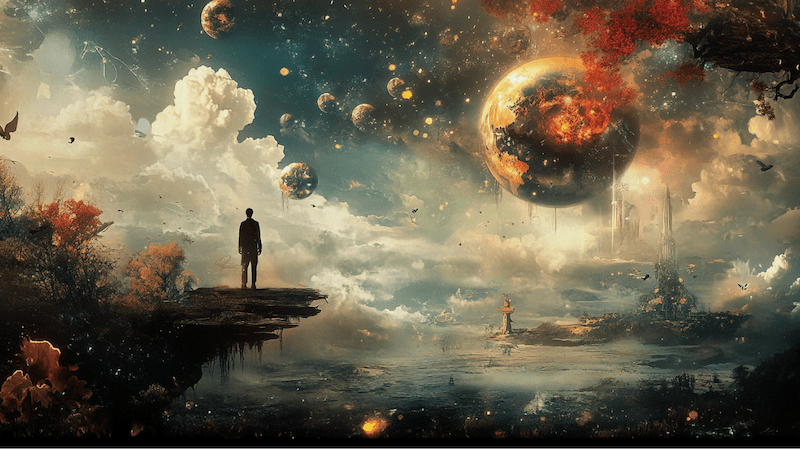In astrology, addiction is usually associated with Neptune and the 12th house.
Maybe that’s because of the mystique this archetype is associated with – the fog, the escape, the longing, the outerworldliness.
But in practice, things are not that black and white – they’re much blurrier (a Neptunian pun, indeed).
If we look at charts, the odds of people struggling with addiction having a prominent Neptune or 12th-house influence are not higher than those with any other placement.
If only it were that straightforward! But it’s not – because if there were a clear “addiction formula” in astrology, we’d know exactly where to look for it… and then, theoretically, we’d know how to heal it too, right?
Addiction – A Symptom Of Longing For Transcendence
Neptune can indeed amplify addictive tendencies or longing for escape, but not for the reasons we might expect.
It’s not that Neptune causes addiction. Instead, addiction is a symptom – a signal of something deeper – something that Neptune really stands for.
According to Carl Jung – and by the way, did you know that Alcoholics Anonymous and many recovery programs were inspired by Jung’s ideas? – addiction is a misguided search for transcendence.
People who succumb to addiction have a strong longing to connect with the divine – yet they don’t know how to get there – so addiction becomes a shortcut to transcendence – a way to momentarily touch the infinite.
It’s no coincidence that we use the same word for spirit (as in spirituality) and spirit (as in alcohol).
In our “Addiction” program, Neptune is one of 3 main addictive pathways – 3 symbolic routes the psyche takes in its search for transcendence.
Neptune is not the only one. The other 2 paths are Uranus and Pluto. Together, these 3 outer planets represent the 3 core addictive patterns – what in neuroscience are often described as the uppers, downers, and outers.
Addiction – The Outer Planets
Why do the outer planets correspond to addiction?
Unlike the Sun, Moon, Mercury, Venus, Mars, Jupiter, or Saturn – the outer planets are invisible to the naked eye. They’re a perfect metaphor for the unconscious forces that drive us: powerful, unseen, and not directly accessible.
The outer planets symbolize what lies beyond our sight – forces we can’t easily relate to, yet which still shape us, just as those distant planets, though invisible to the eye, continue their silent orbit around the Sun.
The outer planets symbolize the urge to transcend the ordinary, 3D world – the realm symbolized by the visible planets up to Saturn – and to reach toward something beyond the limits of the known.
When the outer planets touch our personal planets, that drive toward transcendence is awakened – but we don’t always know how to access it in a conscious way.
For example, if someone has a natal Sun-Uranus or Moon-Pluto aspect, there’s a pull toward transformation or higher awareness. Yet the influence of the outer planet can be too intense, too distant, or too abstract for the personal planet to integrate fully.
It’s like feeling a deep craving for something you can sense but can’t quite reach – because the basic psychological processes represented by the personal planet aren’t yet mature or grounded enough to meet the intensity of the outer planet’s call.
And this is often when addiction steps in – as a shortcut or a quick “solution” that temporarily gives us a glimpse of transcendence.
We all do this to some degree. While only about 10% of people develop clinical addiction, we all have addictive tendencies, because we all carry a spiritual hunger that today’s world – and our own psychological defenses – make it hard to satisfy in healthy ways.
And this is where it gets truly interesting – and where astrology can help us the most: when we start to understand which addictive path we’re drawn to, and what that reveals about our own psyche and longing for transcendence.
Addiction – Uppers, Downers, Outers
In our model, Uranus represents the upper path to transcendence. In addictive neurochemistry, this corresponds to the dopamine reward pathway – these are the addictive substances or behaviors that stimulate, excite, and keep us “on.”
Pluto represents the downward path, which aligns with the opioid pathway – the drive to soothe, release, and sink in.
And our friend Neptune represents the outer path – the escapist form of transcendence. The dissolving, drifting, or blurring of boundaries that can come through fantasy, substances, or avoidance. One of the 3, but by no means the only one.
While each of us has a primary addictive tendency – at different times in our lives and in different circumstances, one path may become more pronounced than the others.
URANUS: When we feel uninspired or bored, the tendency is to look for stimulation – to “get out there.” In this state, we might follow the Uranian path, which can range from the innocent morning coffee that “wakes us up,” to more intense expressions like gambling or sex addiction.
Anything that can energize us, make us feel alive, or remind us that we still have agency.
PLUTO: If instead we feel overwhelmed, disconnected, or inauthentic – living a life that deep down we know isn’t truly “us” – then the Plutonic path becomes the go-to approach.
Pluto’s downward modus operandi (think alcohol, sleeping pills, or emotional withdrawal) is to shut out the external noise so we can turn inward and reconnect with what really matters.
The Pluto path is the opposite of Uranus’ – both can become addictive, but for diametrically opposed reasons.
NEPTUNE: And if we feel the weight of life, overworked or emotionally exhausted, then the Neptunian path of escapism often takes over. Neptune’s pull is toward softening reality – numbing the sharp edges of existence.
This can take many forms, from Netflix binging to fantasy or romantic love – you’d be surprised (or maybe not) how often people “fall in love” right when they’re facing something they don’t want to confront.
But what’s really interesting about our addictive tendencies is what they signal.
Addiction is not just a “problem to be fixed.” Even when we “cure” addiction through abstinence or sobriety, a new addiction often takes its place – because the drive for transcendence, the spiritual hunger, is still there.
So the goal is not to “fix” addiction without first understanding where it comes from and what it’s pointing toward.
Because addiction is much more than a ‘bad habit’ – it’s our higher self calling out through distortion, saying: You want something beyond the ordinary. You want something more authentic, more aligned with your true path.
Addiction And Transform Your Life With Astrology
Addiction is the first course in our Transform Your Life With Astrology program. We believe we need to start here – even when our addictive tendencies are mild – because they hold essential clues about who we are and the direction of our path.
The other 3 courses “Shadow”, “Purpose” and “Service” – represent the subsequent stages in the individuation process.
You can now enroll in the “Addiction” course, which starts on November 10th, or sign up for the entire Transform Your Life With Astrology program at 20% off.
More details at the link below:
“Addiction” and “Transform Your Life With Astrology”
The post Neptune = Addiction? first appeared on Astro Butterfly.


